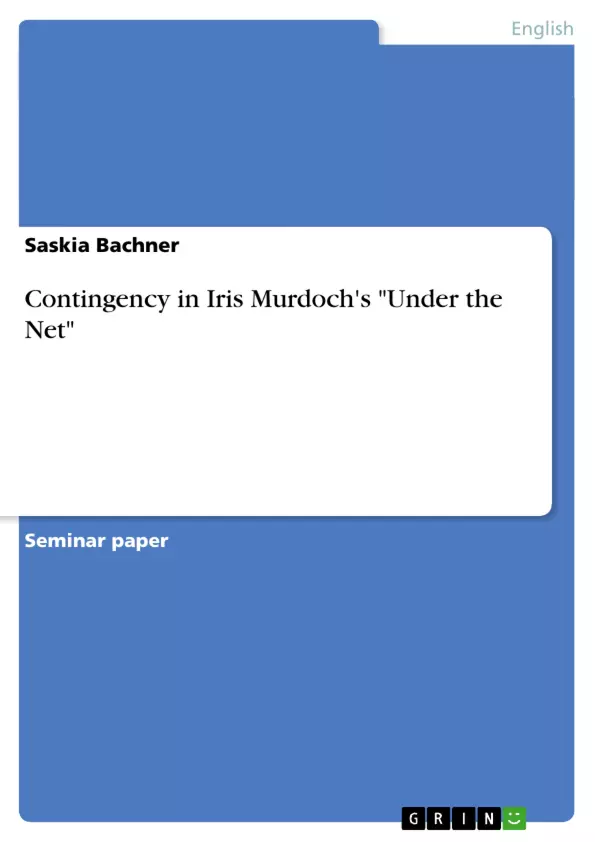All human beings have a deep need for necessity in their lives. We want to know why we exist, we want to understand the world and its secrets, and we want to know our place in the world. Concepts like religion and philosophy are concerned with those questions and try to provide answers to them. Nevertheless, there are still no satisfying explanations. This is due to the fact that “our actual lived experience has no form or unity in itself, but is full of contingent rubble, accident, and unsystematized detail which may resist our attempts at unity” (Antonaccio & Schweiker, Human Goodness 111). As our world is contingent, it cannot be completely understood. Consequently, we should accept its contingency instead of denying it by trying to find an explanation to everything.
The stress ratio between contingency and necessity is also the theme of Iris Murdoch’s first novel Under the Net. Throughout the novel, the protagonist Jake Donaghue searches for his own identity and for a master theory which is able to explain the world (cf. Porter, Leitmotiv 379). In the end, he realizes that he has to change his attitude towards contingency.
In the following, I will try to find reasons for the change of Jake’s attitude, and I will describe the consequences of this change. In order to be able to do this, I will first provide a definition of the term ‘contingency’ and place it in the context of philosophy in chapter 2. Afterwards, I will explain some essential aspects of contingency in the novel in chapter 3. In chapter 4, I will have a look at Jake’s changing attitude towards contingency in the course of the novel in order to, finally, be able to find reasons for the change and to describe its consequences in chapter 5 and 6.
Inhaltsverzeichnis (Table of Contents)
- Introduction
- Definition and Theoretical Background of ‘Contingency’
- Contingency in Under the Net
- Contingency and Individuals
- Contingency and Language
- Contingency and Art
- Jake Donaghue's Changing Attitude towards Contingency
- Jake's Attitude at the Beginning
- Contingency in Jake's Life
- Jake's Change
- Reasons for the Change in Jake's Attitude
- The Influence of Other Characters
- Hugo's Influence
- Anna's Influence
- Jean Pierre's Influence
- Dave's Influence
- Misinterpretations
- The Influence of Other Characters
- Consequences of the Change
Zielsetzung und Themenschwerpunkte (Objectives and Key Themes)
This paper examines the concept of contingency in Iris Murdoch's novel Under the Net. The main objective is to analyze the protagonist, Jake Donaghue's, changing attitude towards contingency throughout the novel. The paper will explore the reasons for this change and its consequences.
- The philosophical concept of contingency
- The portrayal of contingency in Under the Net
- The significance of contingency in shaping individual identity
- The role of other characters in influencing Jake's understanding of contingency
- The consequences of embracing contingency
Zusammenfassung der Kapitel (Chapter Summaries)
The paper begins by introducing the concept of contingency and its philosophical background, drawing on the work of thinkers like Aristotle, Husserl, and Sartre. It then delves into the novel, exploring how Murdoch uses contingency to shape the narrative and characters. The paper examines the protagonist, Jake Donaghue's, initial struggle with the world's uncertainty and his evolving understanding of the role of contingency in his life. The paper explores the impact of other characters on Jake's changing attitude, highlighting the influential figures in his life and the ways in which their perspectives help him to embrace contingency.
Schlüsselwörter (Keywords)
Key words include: contingency, necessity, identity, Under the Net, Iris Murdoch, existentialism, Sartre, philosophy, literature, character development, influence, acceptance.
Frequently Asked Questions
What is the central theme of Iris Murdoch's "Under the Net"?
The novel explores the tension between contingency (accidental details of life) and necessity (the human need for order and meaning).
How does the protagonist, Jake Donaghue, change throughout the novel?
Initially searching for a "master theory" to explain the world, Jake eventually learns to accept and embrace the world's inherent contingency.
Which characters influence Jake's attitude towards contingency?
Characters like Hugo, Anna, Jean Pierre, and Dave play significant roles in challenging Jake's perspectives and aiding his personal development.
What is the philosophical definition of 'contingency' in this context?
Contingency refers to the "rubble" of lived experience—accidents and unsystematized details that resist attempts at unity or complete understanding.
How does Murdoch use language to portray contingency?
The paper examines how language often fails to capture the messy reality of life, reflecting the struggle between structured thought and contingent reality.
- Arbeit zitieren
- Saskia Bachner (Autor:in), 2008, Contingency in Iris Murdoch's "Under the Net", München, GRIN Verlag, https://www.grin.com/document/114252



